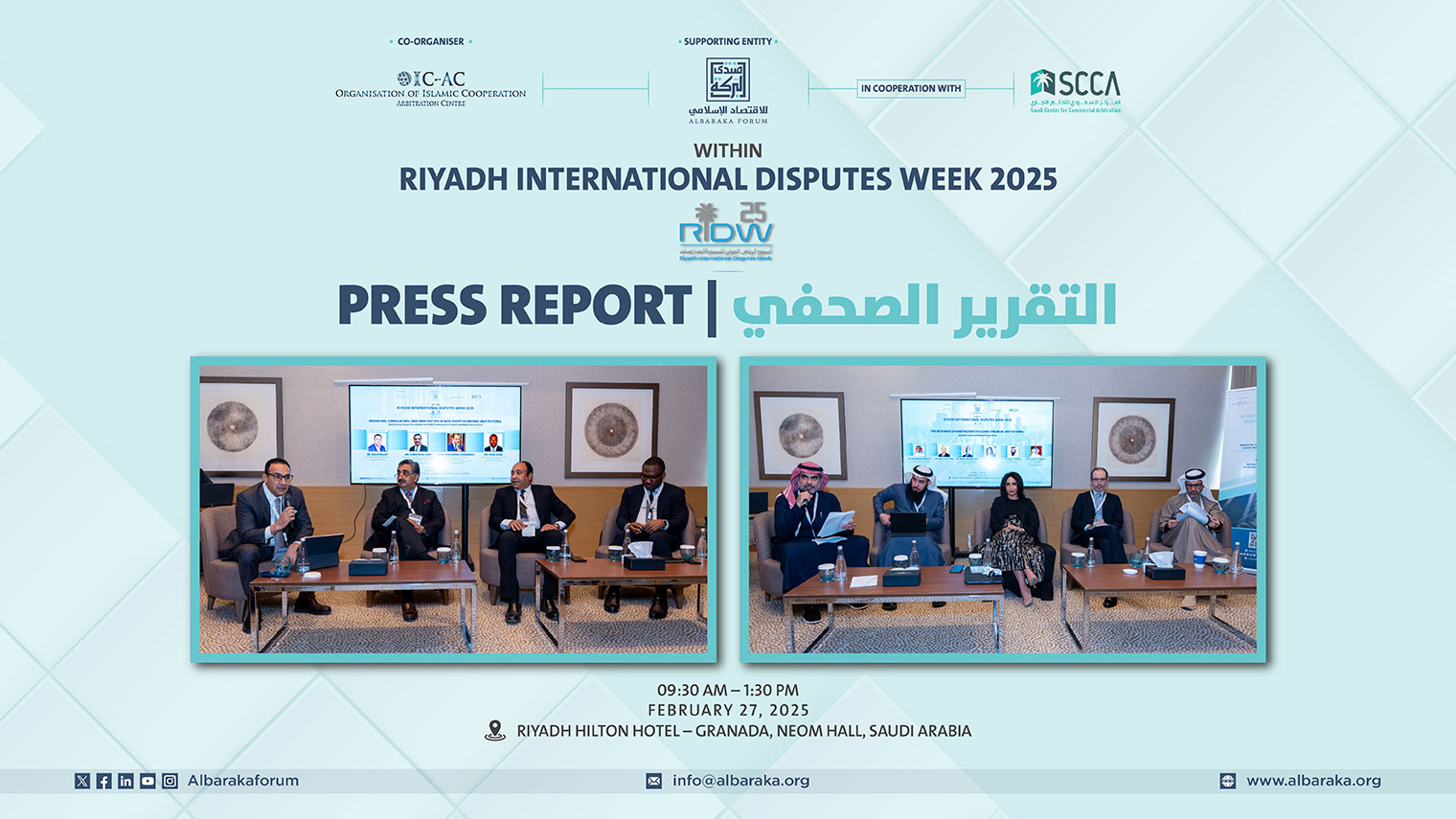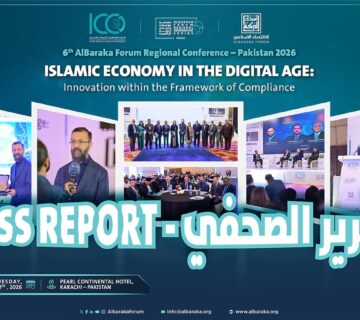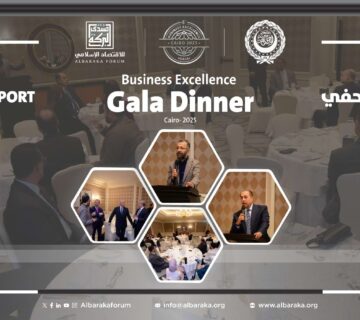With economic experts, and specialists gathered on one platform, AlBaraka Forum for Islamic Economy’s activities at Riyadh International Dispute Week took place on Thursday, February 27, 2025, at Riyadh Hilton Hotel – Granada, Neom Hall, Saudi Arabia, in cooperation with the Saudi Center for Commercial Arbitration, and Co-Organizing with the Islamic Cooperation Arbitration Centre (OIC-AC)
1st session:
Under the title “Mediation, Conciliation, and Arbitration in Non-Profit Economic Institutions: Optimizing Dispute Resolution and ADR Frameworks in Zakat and Waqf Governance”, and with the participation of leading experts, the first session of AlBaraka Forum’s activities at Riyadh International Dispute Resolution Week has officially kicked off.
Dr. Walid Hegazy, Founder and Managing Partner, Hegazy and Partners, moderated the first session, starting by giving a basic brief about the topic for those who are not that familiar with waqf and Zakat, highlighting their definition and their specific ways of handling dispute resolution, assuring that zakat and waqf disputes must be settled as quickly and inexpensively as possible to prevent the further waste of the zakat/waqf assets
During his presentation, Dr. Walid highlighted that there are challenges in the ground market, like distribution, frequent issues, equitable allocation, and transparency. Adding that Zakat management may be straightforward in Muslim majority countries with explicit zakat regulations, while in non-Muslim majority countries, it is quite challenging, He also mentioned that zakat management involves supervision and control over the zakat funds’ collection and their distribution to the beneficiaries.
Mr. Ahmer Bilal Soofi, Advocate of the Supreme Court of Pakistan, and the Senior Managing Partner of the firm and the head of its dispute resolution practice at ABS & Co, Islamabad, Pakistan, tackled the Legal space for mediation in Waqf and Zakat disputes, highlighting Alternative Dispute Resolutions like Mediation, Arbitration, and Conciliation, mentioning the Major Waqf Issues in the Muslim World, giving example by Turkey, as the Court ruled that government not to excessively interfere in autonomy of waqf authorities, while in Egypt, the Court prevented sale of Waqf land on purpose extraneous to endower’s intent (2010).
Judge Mohammed Shamroukh, Judge at the Cairo Court of Appeal – Cairo Economic Court, Supervisor of the Electronic Litigation Program – Cairo Economic court, stated that Online Dispute Resolution has proven highly effective in the Economic Court. He highlighted that remote mediation and litigation reduce costs and accelerate procedures, making them particularly suitable for commercial and financial disputes, where efficiency is directly linked to speed and cost reduction, highlighting that the introduction of electronic litigation at the Cairo Economic Court has significantly improved judicial efficiency. He explained that while cases previously took up to a year and a half, they are now completed within a maximum of six months across all litigation stages. He emphasized that online mediation could be the ideal solution for waqf disputes due to their widespread assets
Dr. Umar Oseni, Secretary General, Organization of Islamic Cooperation Arbitration Center, (OIC-AC), Underscored the introduction of the SPEDR model (Specialized Express Dispute Resolution) under UNCITRAL, a significant step towards enhancing efficiency and timeliness in arbitration and mediation. Given the importance of speed and accessibility in dispute resolution, this model could be particularly useful for Islamic economic institutions that need quick resolutions to maintain operational stability and trust. One of the key takeaways here is the balance between Shariah compliance and legal enforceability. For Waqf entities, the question of who bears the cost of arbitration is crucial, distinguishing between negligence of the trustee versus costs being borne by the Waqf itself highlights a potential gap in current legal frameworks.
2nd session:
Under the title “The Relevance of Arbitration to Islamic Financial Institutions: Current Trends and Future Perspectives”, Bringing together top professionals in the field, the second session of AlBaraka Forum’s activities at Riyadh International Dispute Resolution Week has officially kicked off
Mr. Saad Mansour AlMansour, Managing Partner at SAHAM Law Firm and Arbitrator at the Saudi Center for Commercial Arbitration, moderated the second session, demonstrating exceptional dialogue management skills, introducing the speakers with distinction and steering the discussion with remarkable expertise, making the session both insightful and engaging.
Dr. Faisal Alshammari, Founding Partner, Faisal Saleh AlShammari Law Firm and Legal Consultations, addressed the topic “The Importance of Arbitration for Islamic Financial Institutions: Current Trends and Future Prospects,” where he highlighted reconciling the principles of Islamic Shariah with modern arbitration practices, and the main arbitration points and their implementation in Islamic financial contracts. He also explained that the importance of arbitration in Islamic financial institutions includes the ability to deal with technical applications and practices in Islamic finance without being bound by judicial precedents and principles, and the compatibility of arbitration decisions with the provisions of Islamic Sharia because they are issued by specialists in Islamic finance technically and legally, and the inability of foreign courts to consider new cases in Islamic financial transactions. He also reviewed international arbitration frameworks, highlighting the New York Convention (1958), which guarantees the recognition and implementation of foreign arbitration awards.
Mr. Antonio Viñal Menéndez-Ponte, Partner in the Spanish Law Firm AVCO Legal, Head of its Lisbon office and Arbitrator at the Spanish-Portuguese Chamber of Commerce’s Arbitration Council stated that aligning arbitration with Maqassid (Shariah objectives) is essential to ensuring fairness and transparency. He emphasized the need for proactive dispute prevention in Islamic finance, highlighting the impact of cross-border enforcement challenges and public policy exceptions on arbitral awards. He also stressed the need for a holistic approach that ensures fairness, transparency, and alignment with Sharia objectives. Mr. Antonio also highlighted the importance of allowing parties to choose among different Islamic schools of thought, ensuring flexibility while maintaining legal certainty in dispute resolution.
Dr. Amel Makhlouf, Attorney at Law, Paris Bar Association Member of the Management Committee, SOAS Arbitration and Dispute Resolution Centre (SADRC), Centre of Islamic and Middle Eastern Law (CIMEL), SOAS University of London, tackled “The Rise of Islamic FinTech in the MESEA region: Unlocking arbitration for sharī‘ah-compliant digital disputes” highlighting the finTech revolution in Islamic finance from North Africa to Asia, explaining its intersection process of finance & technology, and how it expanded to join Muslim-majority jurisdictions trends, highlighting the global finTech landscape in Islamic finance, including digital payments, blockchain, investments, crowdfunding, and digital savings
Mr. Ali Ismael Al Zarooni, Founder and Managing Partner, Horizons and Co law firm, highlighted the necessity of integrating modern technology into arbitration beyond basic applications such as online payments and virtual hearings. He emphasized that true technological advancement requires adopting electronic bundles, digital case management, and automated procedures to enhance efficiency and accessibility. Pointing out that while global arbitration centers are rapidly modernizing, Islamic arbitration centers must accelerate their adoption of these technologies to remain competitive and effective.




